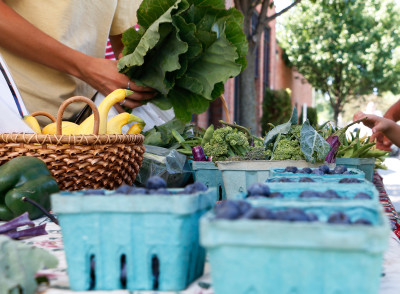
Boston University Dining Services released its 2015 Sustainability Report earlier this month following a semester-long survey last fall. The report highlights some of the university’s latest accomplishments and continuing efforts in achieving sustainable dining on campus since the initiative began in 2007.
As 90.3 percent of the 3,049 student respondents declared sustainability as an important issue to them, the report states that “together we’re making a difference, a big difference.”
After eight years of effort, the report presents the university’s most significant progress yet. Last year, BU Dining committed to getting 20 percent of its food from sustainable resources by 2018. The school achieved that goal this year, three years ahead of schedule.
The report shows that over the past year, 22 percent of the food and beverages BU Dining purchased met the Association for the Advancement of Sustainability in Higher Education’s Sustainability, Tracking, Assessment and Rating System’s sustainable food criteria.
The 22 percent included a cumulative 328 tons of sustainable food, including 23 tons of beef from grass-fed cows, 53 tons American Humane Certified turkey and 250 tons of cage-free and American Humane Certified eggs, according to the report.
Sustainability Coordinator Sabrina Pashtan said that accomplishing the goal early required “effective colaboration and strong partnerships” with supply chains, farmers, processors, vendors and distributors around the New England area.
“A lot of great co-ops in the region are able to supply us with certain products such as ground beef, hamburgers and hot dogs, as well as dairy,” Pashtan said in an email. “Our chefs and buyers have worked hard to accommodate these new products into our menus, and to make locally-grown produce a priority in season, something which often requires more planning, organization and hard work to accomplish.”
Pashtan also said she hopes the report “inspires others to explore where their food comes from and make informed food decisions, both on campus and when they leave.”
The report further states that BU Dining looks forward to replacing current conventional pork with 100 percent gestation crate-free pork by 2017 and 100 percent sustainable seafood by 2018, as well as by helping build a New England food system, supporting local businesses.
Director of Dining Services Barbara Laverdiere said that BU has “made a lot of progress” in sustainable living and food since she came to the universty in 2005.
“It’s not easy sourcing local food items that meet our criteria when you have almost 10,000 students on meal plans,” she said in an email statement. “We’ve had to be very creative and aggressive on many fronts to get what we need.”
Dean of Students Kenneth Elmore said the Sustainabilty Program has urged him to be more mindful of what he eats and where it comes from.
“There’s a big push about local sourcing. That’s one of those things, for example, that makes me think a little bit more about my food in general,” Elmore said. “A basic thing like eating, a basic thing like food, truly can make a difference if more of us are conscious about it.”
Cutler Cleveland, professor of earth and environment in the College of Arts and Sciences, said that it’s important for a university like BU to enact sustainable methods and ensure that the community participates in them.
“We have a responsibility in the business side of the university to make sure that the goods and services we provide students, faculty and staffs to support them is also consistent with our teaching and research’s mission and sustainability,” Cleveland said. “Food is a major part of that footprint of a university. Paying attention to the whole chain of food supply, how it’s produced, how it’s transported to how it’s processed, how its consumed, how its disposed … is extremely important.”
Several BU students said the report tells them how important sustainable eating and living is for the university as well as for the greater Boston area.
Lina Marcela Gonzalez, a first year graduate student in the College of Fine Arts, said that the result of the report proves how BU can aim for more ambitious goals in fostering sustainability for the future of campus life.
“The result [of the report] is pretty remarkable,” Gonzalez said. “What we’re trying to achieve, our prime goal is to make life better, and we cannot afford not to find ways to do things that are more amicable, efficient and economical.”
Emily Whittington, a junior in the College of Communication, said she appreciates BU’s efforts to engage the Boston community in its sustainability program and efforts.
“[BU] should help and support local farmers as well and that’s one thing I really like that BU does. It makes sense to get food closer to you and also just support the local economy,” Whittington said. “Being such a big university and establishment in Boston, it’s good that they are leading the way to sustainable living.”
Steven Li, a junior in the College of Engineering, said that BU should better inform students of its sustainability efforts due to the importance of the issue.
“I haven’t heard that much, so probably begin with spreading their achievements. I think this report is a good start,” Lee said. “Or emphasize that a specific type of food in the dining hall is received through sustainable efforts.”




